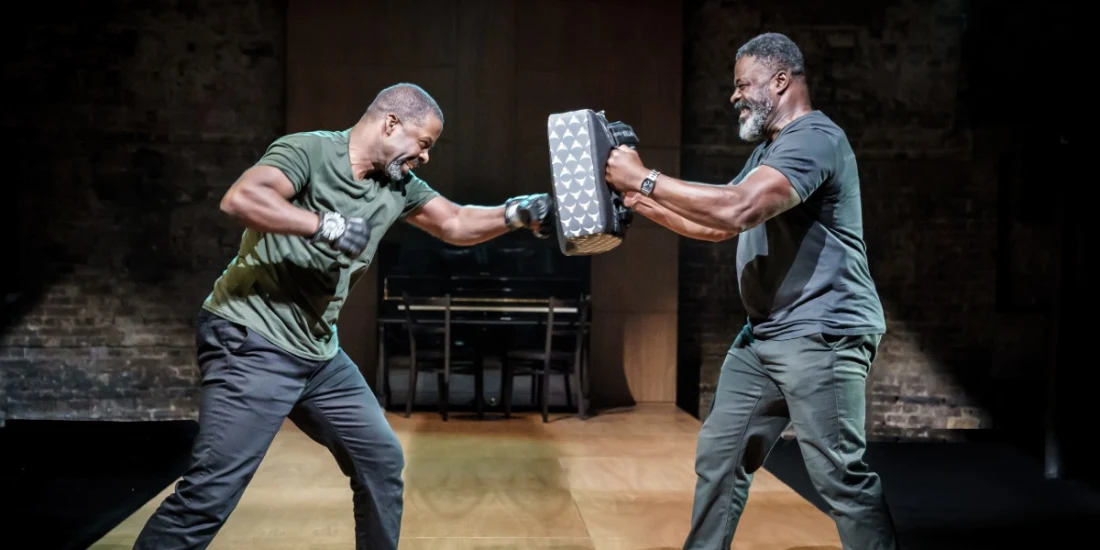Adrian Lester mesmerizes in Almeida Theatre's streamed 'Hymn'
From live to livestream: that's the unexpected path charted over time by the new two-hander Hymn, which pairs the playwright Lolita Chakrabarti with her husband, actor Adrian Lester, nine years after their collaboration on Red Velvet took them to the West End and New York. Conceived specifically for the constraints of the pandemic, the original intention here was for a modestly conceived piece that could be performed before a socially distanced audience at this important Off West End venue.
Instead, along came Britain's third lockdown in December, following which a decision was bravely taken to present the play live online for five days through Feb. 21. That this has been achieved is no minor feat given that the surpassingly adroit director, Blanche McIntyre, is a self-described newbie to the ways of the camera and, also, that both Chakabarti and Lester themselves did battle with Covid-19 over the recent holidays. (That bit of news emerged during a sweet q-and-a following Thursday's opening performance, a conversation chaired by the Almeida's artistic director, Rupert Goold.)
The title is a homonym, referring in the first instance to the sort of music you might hear in the very church setting where the 90-minute play begins. But it also acknowledges the sound-alike pronoun, him, as befits a study in masculinity. The intriguing difference is that this particular bromance has been written by a woman, Chakrabarti, who spoke during the q-and-a of drawing inspiration from the numerous men in her life and wanting to write about male bonding but not from a sexual or romantic point of view.
And so we find Gil (Lester), the only male amid four siblings who is first seen delivering the eulogy at the service for his father, Augustus, a hard-working Jamaican immigrant to the UK who has died age 86. It's only as Gil is preparing to leave the memorial that he is interrupted by a stranger in his midst, Benny (Danny Sapani), an edgy figure who has a tale to impart that may upend Gil's sentimentalised notion of his father as any kind of "hero." Those wanting to discover the narrative swerves of the plot for themselves should stop reading here, complete in the knowledge that they will pay witness to two entirely gorgeous performances from the very actors for whom Chakrabarti, for the first time in her busy writing career, specifically wrote the play. (Also an actress, Chakrabarti is expected to be represented on the West End later this year with her acclaimed adaptation of Life of Pi, which has Broadway in its sights.)
Spoilers very much ahead, then, to relate that Benny has in fact come to inform Gil that the two of them, born barely a week apart, share a father. That, in turn, means Gil must be defined anew not only by three older, variably successful sisters whom he seems to hold in awe (that one of them is a head teacher makes explicit a connection to Chekhov's Three Sisters), but, now, by a half-brother with whom Gil will from nothing form a strengthening bond. The differences between these men and their upbringings and aspirations are as profound as a connection whose intensity is largely achieved through musical interludes that get folded into the play as neatly as the soundscape of Bob Dylan, by way of comparison, informs Girl from the North Country. The choice of music leads to the unexpected (to put it mildly) inclusion of "I Could Have Danced All Night", with such standards as "Lean On Me" and "Papa Was a Rolling Stone" sung along the way by one or another of the men, or by them both.
One clocks other plays' influences. A climactic speech seems directly to invoke John Guare's Six Degrees of Separation even as the governing arc of the play pays an implicit debt to Death of a Salesman: there, too, is a play about a father tearing at the fabric of his relationship with two sons. It's to Chakrabarti's credit that she folds in references to the here and now, from the Black Lives Matter protests that ensnare Benny's (unseen, of course) son, Louis, to the roiling arguments over statuary that have beset this country of late. With Prema Mehta's lighting striking a dusky mood, the actors navigate Miriam Buether's simply appointed set as if they had occupied the space for weeks; in fact, the play opened after a single preview.
Their shared rapport is doubly astonishing given an ongoing protocol requiring the two men not to touch: the nearest they come is a boxing match sustained without actual physical contact. And even when the writing seems to skip a beat - one could actually imagine Hymn teased out into something longer, and the writing turns prosaic just when you want it to soar - both actors are remarkable. Sapani brings a wounded grace to his portrayal of a father, and a son, aware on both fronts of the grievous faultlines within the very society in which he is attempting to make his way. A loose-limbed Lester, in turn, steers the scripted shifts in mood with mesmeric ease, revealing incrementally the degree to which a bit of knowledge can be both a liberating and lacerating thing. How lucky are we to have had Hymn for even a virtually realised week, following which the answer to our prayers will surely come when theatres open their doors once again.
Hymn will stream on Sky Arts on 18 April at 9pm.
Photo credit: Adrian Lester and Danny Sapani in Hymn (Photo by Marc Brenner)
Originally published on
